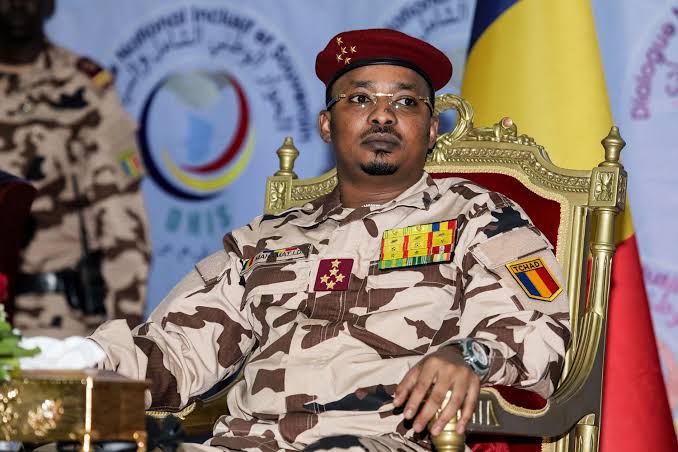A violent assault on Chad’s presidential palace on Wednesday night has left 19 people dead, including 18 attackers and a soldier, while six assailants have been taken into custody. The incident, which took place during a tense political climate in the capital, N’Djamena, has raised questions about the security of the Chadian government and its ongoing struggle to maintain stability after years of unrest.
The palace, the heart of the Chadian political establishment, was targeted by a group of armed assailants under cover of darkness. The attack unfolded just hours after President Mahamat Deby Itno hosted a high-profile visit from Chinese Foreign Minister Wang Yi, who had come to congratulate Chad for re-establishing constitutional order.
Despite the gravity of the situation, Chadian authorities swiftly brought the assault under control. Foreign Affairs Minister Abderaman Koulamallah, speaking to the public in a late-night Facebook broadcast from inside the palace, confirmed that the situation was under control. “There is no fear. The palace is safe, and the attackers have been neutralized,” Koulamallah said, flanked by armed soldiers.
While Koulamallah assured the public of the government’s grip on the situation, the details surrounding the attack have been met with confusion and speculation. Initial reports suggested the involvement of extremist groups, with online rumors hinting that the notorious Boko Haram might have been behind the assault. Boko Haram, a jihadist organization that has terrorized Nigeria and surrounding nations for over a decade, has recently been linked to insurgent activities in Chad.
However, Koulamallah dismissed these claims during his address, stating that the attackers were likely local youth from N’Djamena. “They were disorganized and likely under the influence of drugs and alcohol,” the minister explained. He further emphasized that there was no indication that the attack had links to terrorism, suggesting instead that the assailants were politically motivated rather than ideologically driven.
The attack came amid a tense backdrop of political unrest in Chad. President Deby Itno, who assumed leadership in 2021 following the sudden death of his father, long-time president Idriss Deby, has faced numerous challenges to his rule. The country’s political landscape has been marked by disputes over election results, military control, and growing dissent among the population, which has led to numerous protests and calls for greater political freedoms.
The death of Idriss Deby, who had ruled Chad for over three decades, created a leadership vacuum that his son quickly filled, though his succession was met with both domestic and international skepticism. His decision to remain in power as interim president following the controversial elections last year further deepened tensions within the country. Critics argue that the younger Deby’s presidency is a continuation of his father’s authoritarian rule, with little room for democratic reforms.
Chad’s security forces have been stretched thin as they try to manage the aftermath of these tensions, which have resulted in violent demonstrations and civil unrest. Despite the government’s efforts to contain the situation, armed insurgent groups operating in the region remain a constant threat to stability.
The recent attack on the presidential palace, which occurred on the same day as Minister Wang Yi’s visit, has underscored the fragility of Chad’s political system. Observers note that Chad’s close ties with foreign powers, including China, have played a significant role in its political trajectory. China’s involvement in Chad has centered around investments in infrastructure and energy, but some have questioned the long-term impact of these partnerships on the country’s political independence.
“The political climate in Chad is precarious,” said security expert Ibrahim Hassan, who specializes in Central African affairs. “The combination of military rule, political unrest, and external influences makes the country vulnerable to further instability. This attack on the palace could be seen as a symbol of the dissatisfaction among some Chadian factions with the current leadership.”
While authorities are still investigating the motives behind the attack, the involvement of local youth in the assault is being seen as a sign of growing frustration among the population, particularly in urban areas where poverty, unemployment, and political disenfranchisement are rampant.
Despite the government’s efforts to maintain control, analysts suggest that the violence in Chad could escalate if there is no meaningful dialogue between the ruling authorities and opposition groups. “It is important that the government listens to the people’s grievances and works towards a more inclusive political process,” said Adama Tchad, a prominent Chadian civil rights activist. “The risk is that without reforms, we could see more of these kinds of attacks in the future.”
For now, President Deby Itno’s government appears to have weathered the storm. The swift action of security forces in neutralizing the assailants has been praised, but questions remain about the underlying causes of the attack and its broader implications for Chad’s political future.
As the situation in Chad continues to unfold, the world watches closely. With ongoing challenges from extremist groups, domestic opposition, and a fractured political landscape, the attack on the presidential palace serves as a stark reminder of the delicate balance of power in one of Africa’s most volatile regions.
While the attackers are dead or detained, the consequences of the assault could ripple through Chad for months to come, further intensifying the country’s political crisis and potentially leading to more unrest if urgent reforms are not introduced. As Minister Koulamallah assured the public that there was no cause for fear, the true security of Chad’s political future remains uncertain.

